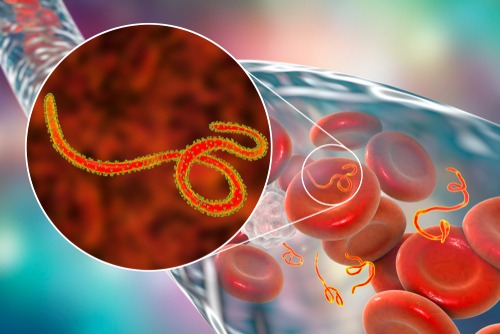
According to preclinical data produced by Soligenix, Inc. this week, positive, effective results have been demonstrated by multiple filovirus vaccine candidates.
In collaboration with the University of Hawaiʻi at Mānoa, Soligenix’s vaccines proved capable against three potentially deadly filoviruses: Zaire ebolavirus, Sudan ebolavirus, and Marburg Marburgvirus. Each was tested on non-human primates, according to details published in Frontiers in Immunology, and contained highly purified protein antigens combined with the novel CoVaccine HT adjuvant.
Filoviruses require direct contact with infected bodily fluids or animals to transmit, but one afflicted, the infected typically face high mortality rates. Few effective therapeutics exist, leaving mortality rates often dependent on the type of supportive care provided early on in treatment.
“Filoviruses are endemic in areas of the world where the power supply can be uncertain, making a thermostable vaccine particularly valuable,” Dr. Axel Lehrer, Associate Professor at the UHM Department of Tropical Medicine, Medical Microbiology and Pharmacology, said. “Our work to date has demonstrated not only the feasibility of rapid and efficient manufacturing but also the applicability of thermostabilization of multiple antigens with the potential for a broadly applicable and easily distributed vaccine.”
If developed, Lehrer added, such vaccines could address emerging outbreaks, such as the Marburg virus infection that recently afflicted Guinea. It also represents a step toward developing prototype vaccines against some of the top viral families with pandemic capability.
“Having such a platform available would likely enable broader and faster worldwide vaccination campaigns addressing future health emergencies,” Lehrer said. “In addition, the ability to combine antigens in the formulation also enables generation of potentially broader protective vaccines.”
The filovirus vaccines were thermostabilized, multivalent vaccines put in a single vial platform presentation. They had both monovalent (single antigen) and bivalent (two antigen) formulations, as well as a combination of all three antigens and adjuvant, which yielded a 75 percent protection rate for non-human primates against the Sudan ebolavirus specifically.
“The continued advances in the filovirus program demonstrates the program’s maturity and overall ability to successfully develop vaccines against these lethal viral threats,” said Dr. Oreola Donini, senior vice president and chief scientific officer of Soligenix. “The compatibility with thermostabilization, and the identification of key stability indicating assays, are both hallmarks of a potentially broadly applicable vaccine platform.”




